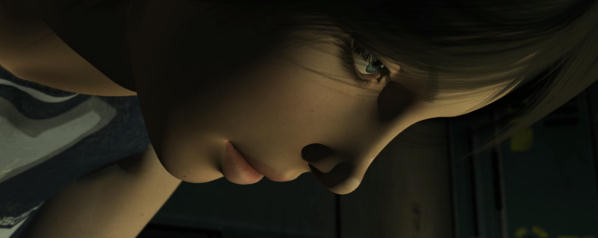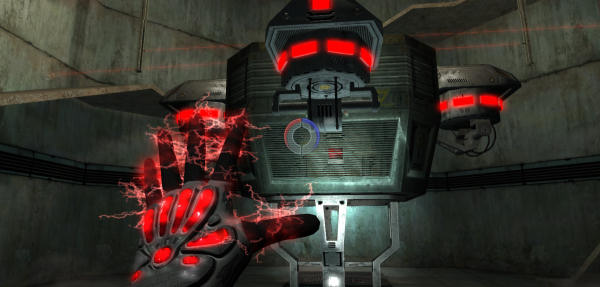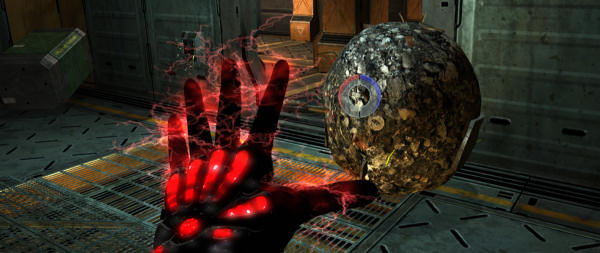Wot I Think: Twin Sector
Anything that has magic gloves and puzzles is worth a look. Twin Sector comes from German developers DnS Development, a first-person puzzle game with echoes of Portal. Can it live up to such an inevitable peer? Here's Wot I Think.
In so many ways this is precisely the sort of post-Portal game we should be seeing a lot more of. Smart puzzling, inventive ways to interact with the world, and most of all, first-person gaming that isn't focused on its gun willy. In many other ways, this is a game that falls short not just at its own ambitions, but in its own lack of ambition.
There's been an apocalypse. Earth isn't safe just yet, and a number of humans have been deep frozen until the surface is safe again. You play a be-gloved woman, Ashley Simms, awoken from a cryogenic sleep at some undetermined point in the future to save the lives of all the other sleeping humans. The building's AI overseer, Oscar, has realised things are going wrong and needs some help, and apparently someone to chat to.
On your left hand you wear a red glove, and on your right a blue. The red can pull objects toward you, or you toward objects (depending upon whether they're fixed in place, like walls) and the blue pushes objects away from you, and indeed you away from fixed objects. What this creates is a really smart means for using the environment, and provides a game where you neither need nor want a weapon. And the similarities with Portal don't end there. It's essentially a series of puzzle chambers, where you're asked to use the gloves' abilities in different ways to successfully reach the next lift. There's an abstract computer voice semi-guiding you through. There's turrets and essential boxes. In fact there's one level where you need to ensure you're always accompanied by your (weighted companion) giant ball of trash. And while it's not surprising that Twin Sector falls far short of Portal's perfection, I am delighted that at least someone is trying to make games of a similar vein.
A level may ask you to traverse some laser beams, open a locked door with a key card on the other side of some glass and fire, and climb your way up a tall tower with narrow ledges. The gloves can aid you in all of this, picking up objects to block beams, smashing glass with thrown heavy boxes and dousing fire with cannisters of water, and pulling yourself upward by aiming the left hand at a high point on the wall. Need to make a long drop? Fire off the blue glove just before you hit the ground to cushion your fall. It's a good idea that gets to be used in inventive ways.
The problems, however, arrive quickly. First and foremost, the gloves are clunky. Implemented smoothly, this could have been one of the most entertaining ways to get around a game. But instead they're weirdly limited. Charged up by holding either the left or right mouse button, they have a meter that limits their use. It refills very quickly, just a couple of seconds, but that's bugger all use if you're falling down a shaft because yet again it mysteriously failed to carry you across a small gap. One of Portal's greatest pieces of genius was to let you fall from any height - it liberates the player, letting them experiment without spamming the quicksave button before every footstep. Sadly no such system is in place here. Picking things up has issues too. Pull an object toward you from the other side of a room and it will have gained such extraordinary momentum by the time it reaches you that it bounces off your hands in a mad frenzy. Clearly you want it to zoooooop into your grip, not smash you in the face. Propelling objects away is better, but very often the physics get extremely over-excited and crates or explosive cannisters will perform the most remarkable pirouettes before flinging themselves sideways down a corridor. However, it's most bizarre failing is putting things down. Just letting go is often not an option, the game insisting on shoving things rather than releasing them. When any of this works, it's great. Clearing a big gap by pulling yourself toward the distant ceiling, or smashing a window with a crate, or lobbing a burning cylinder of gas toward a fragile door, can feel majestic. If only this were more constant it would have been brilliant.
The challenges are decent. Things get a bit repetitive in places - successfully getting past a murderous turret is inevitably followed by being asked to get past another murderous turret. Fortunately it knows to mix things up just enough to keep it interesting. So while climbing up a tower loses its appeal, there will likely be a new twist on it when you reach the top. And things are never better than when you get to switch the gravity off, using the gloves to push and pull your way around chambers, trying to manoeuvre vital objects.
Sadly Twin Sector makes another giant mistake, and one that should have been most easily learned from the games that inspired it. It includes moving enemies. In a game without weapons making the player feel helpless and frustrated is never a good plan. Having those enemies be bloody floating balls is just ridiculous. If they touch you, you take enormous damage. Two taps can be enough to kill you. You can somewhat defeat them. Picking up barrels or boxes and throwing them at them will switch them off for around five seconds. Picking them up in an off state and smashing them into a wall damages them. Do this three times (a very laborious process in a game where you can only move at full speed when going forward - side-stepping and moving backwards are guaranteed death in their presence) and they explode. Most likely to be instantly replaced by a new one. While they can very occasionally be used to explode doors, their primary purpose is to make the game more annoying to play. There's no other rationale for their inclusion. Climbing up a tower in a series of glove-powered jumps becomes tortuous when you have to hope they don't bump you at the wrong moment, causing you to fall to your death (your blue meter inevitably empty after trying to shove it out the way half a second before your fall). Their AI is stunningly bad, which means you can trick them into getting stuck under a ledge, but this equally means they can fluke their way into bumping into a door switch and following you interminably. Tracers, these fuckers are called. File them under "Why Oh Why?"
No game should have someone spend so much time with their head in their hands. Twin Sector's load times provide ample opportunities for cradling your weary cranium after your latest infuriating death. Of course, such frustration only occurs when a game is close to being good - a simply poor game would have you switch off. The problem is, I put a lot more effort into trying to like the game than it put into earning it. The gloves are a great idea, and there's a number of interesting ways to use them, but not nearly enough. The levels are uniformly green-grey and dreary, all box shaped. And while the voice acting isn't nearly as bad as you might expect, the script is deathly dull. Oscar's Kevin-Spacy-In-Moon-like voice repeatedly informs you that something's broken, or the unknown enemy is closing in, and Ashley worries in reply. Over and over. And you can't switch the tiring music off. But most significantly, there have to be so very many more innovative ways to use the gloves than are realised here.
Oh, and while I wasn't switching it off in frustration, it was. A peculiar number of crashes (and I've never seen a game crash so quickly - it winks out of existence leaving me back at my desktop without even a flicker) became so frequent that I gave up on what I believe is the final level.
Oh, Twin Sector, why couldn't you have been just a bit better? At £21 it's a short game that's hard to enthuse about. It's a muddled bag of some splendid ideas and some fun glove action. But it irritates too often, whether it's by glitching, crashing or ruining yet another fun puzzle with a sodding Tracer.
You'll rarely find a games critic who doesn't complain about having to put a score at the end of a review - it normally trivialises the hundreds of words that came before it. But in cases like this, where a game is by no means bad, but falls short of being good, that 6 at the end can do a good job of stressing that for all the criticisms above it's nowhere near a monstrosity. We don't put scores, of course.
Twin Sector is available on Steam for £21. You can get the demo here.




